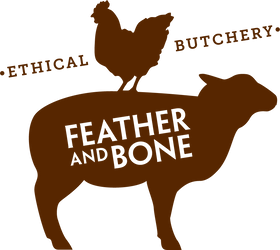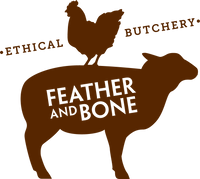We're proud to be slow: a rare offering of 3-4 year-old Gundooee Organic Wagyu
Posted on 19 March 2017.
For almost a decade we’ve been receiving monthly deliveries of whole bodies of Rob Lennon’s excellent, two to three year-old organic Wagyu beef from Gundooee Farm, near Dunedoo, NSW.
But two weeks ago, two 10 year records were broken.
1. For the first time in 10 years Rob cancelled a delivery of his beef. In the aftermath of the terrible fire that ripped through his property last month, regular dispatch was impossible. However, the fire also forced the sale of a mob of 22 outsize, mature steers and Rob was under huge pressure to find an immediate buyer, which is where we come in with the second record.
2. We broke our 10 year record of only buying meat on the bone in spectacular style by receiving a single delivery containing two thirds of those 22 big, beautiful Gundooee steers neatly packed in 146 boxes. It was extremely unnerving to see the delivery truck doors open on pallet-loads of boxes rather than the usual huge carcasses we’re so proud to hang in our cool room and it took a lot of navel-gazing and gin for us to reach this point.
But these are no ordinary boxes and this is no ordinary meat. In fact, by buying this beef felt we were being given a rare opportunity to buy mature, certified organic Wagyu from one of the best growers in the country and, by doing so, help him out in the aftermath of the fire.
The fact that the only way we could buy it was all at once and in boxes was challenging but nothing is ever perfect, life wasn't meant to be easy and when the going gets tough, the tough go shopping. Well, at least that's what we're hoping you'll do...
Our business is organised around a deep and long-standing commitment to growing the extensive, 'slow' food production system practiced by Rob and the other farmers we represent. This drives all our decisions and choices and it's why we've held our line on boxed meat, which represents the antithesis of the slow food principle, for so long. It seems very ironic that, in this case, it's exactly the same principles that drove us to break our own rule so spectacularly.
However, we know Rob’s beef is excellent, our customers love it and we're confident you’ll all demonstrate that love by buying it all.
We're offering a full range of primary and secondary cuts or you can save a little by buying the box.
Here's the low down on why this is so good.
- Unusually mature beef: this beef is from steers that were three to four years old (36-48 months) which is rare - up to three years older than most Australian beef which is mostly 12-18 months old. The market doesn't reward farmers for growing cattle for over two years, in fact they’re less valuable as they age, so there's not much incentive – best to finish them on grain and get them to market as soon as possible.
- Deep flavour: more mature, bigger animals promise a more mature, deeper flavour profile.
- Great marbling: the delicate, silky, intramuscular fat characteristic of Wagyu cattle is at it’s best with older cattle so it’s more pronounced with this beef.
- Long pastured: older animals means more time grazing on the rich and diverse diet of Gundooee pasture - good for the animal, good for us and good for the Gundooee pastures receiving all that excellent fertiliser.
- Nose to tail: unlike the boxes most butchers buy containing multiples of single muscles from unidentified animals, these boxes contain all the parts of 22 specific, three to four year-old Gundooee Organic Wagyu steers - everything from bones and offal to eye fillet and sirloin. Not only can Rob tell us all about each one of them in detail but we visited them several times ourselves.
- Opportunity: after the Sir Ivan fire ripped through his farm last month, Rob needed to sell these 22 steers urgently, ideally to people who'd appreciate and celebrate them. We rarely buy more than two beasts at a time but this was a rare opportunity to buy mature beef and help Rob at the same time. We hope you will too.
WE'RE PROUD TO BE SLOW
As the world becomes ever more frenzied in the pursuit of growth and immediate gratification at all costs, it’s increasingly difficult to find food that is allowed to reach maturity or fruition naturally. Everything is modified for speed: chickens reach market weight at five to six weeks old, most beef is 12-18 months old and fruit and vegetables are picked before they’re ripe.
Regardless of which part we play in the cycle of production and consumption, we’re all deeply entrenched in a lifestyle based on extracting the greatest yield with the least effort in the shortest time. Even while our awareness and collective anxiety about the long-term viability of this approach rockets into the red zone, we’re so hooked in that it feels impossible to change course.
Except that there are some people who choose to buck the system and work to a different rhythm, in sync with rather than against natural systems, with a long-term plan for developing intrinsic resilience and productivity. In the short term, producing food this way takes longer, yields less, earns less and requires more patience and skill than relying on artificial props to generate fertility and abundance.
But, in the long term, the animals and plants they tend are healthier, the food they produce is more nutritious and the improvements in soil health, carbon sequestration and water retention capacity are a boon to us all.
We’re proud to say that it’s this ‘slow food’ system that we (and you) support, these are the 'slow food' farmers we represent and this three to four year-old Wagyu beef is real slow food.
A CLASSIC PRODUCER CONUNDRUM
Self-congratulatory preening aside, this is the sequence of events that led to us buying 2.5 tonnes of boxed meat. In early February, Rob Lennon got in touch to see if we could help to solve a classic producer conundrum.
Like all our farmers, Rob grows to very high standards and he doesn’t dispatch any cattle that don’t meet a clear set of specifications including correct size, weight and fat cover. This means we only ever receive very high quality carcasses which is good for us and good for you.
But sometimes genetics, general growing conditions and the variable nature of pasture-based production cause hiccups in the system and headaches for the farmer. For example, cattle might reach the right size in two years but then take another year to put on the fat required to meet the standard during which time they keep growing and exceed the maximum size that the local abattoir will process.
In this case, Rob found himself with 22 fine, three to four year old cattle in fantastic condition, all of which were too big to be processed by his local Cowra Abattoir. The only option was to send them up to northern NSW to Cassino Abattoir, a big, export processor which didn’t blink at the size but did insist that they wouldn’t get out of bed for less than 20 cattle. Casino also don’t hang bodies of beef - everything is slaughtered, butchered and boxed straight away to meet export standards.
So, Rob had 22 steers that had to be processed in one job lot, his largest regular customer (us) might take three at a stretch in a single delivery but only wanted whole bodies on the bone not boxes of muscles off the bone, the steers were growing bigger each day and there was no feed left at Gundooee after the fires.
It was looking as though the only option was to sell them into the generic organic meat market which is mostly comprised of cattle from vast, dry farms in far Northern NSW and Queensland, different from Gundooee in every respect except the organic certification.
We were keen to help and we knew the beef would be great quality but it was much more than we'd usually buy and we didn’t want to break our rule of never buying boxed meat off the bone.
We were scratching our heads to see if there was any way we could make it work when, on 12 February, the terrible Sir Ivan fire roared across Rob’s beautiful farm, burning all his pasture, destroying infrastructure and scattering his herd which is now agisted across three other organic properties. That changed everything. With no pasture to feed his cattle, Rob no longer had the luxury of time to find a market for his beef so we decided to jump in.
Photos below: 1. Early morning cattle round up for Feather and Bone taken by Mr Bone in November, 2016. 2. Feather and Bone cattle in the yard ready for dispatch, taken by Mr Bone in November, 2016.
 |
 |




Leave a comment